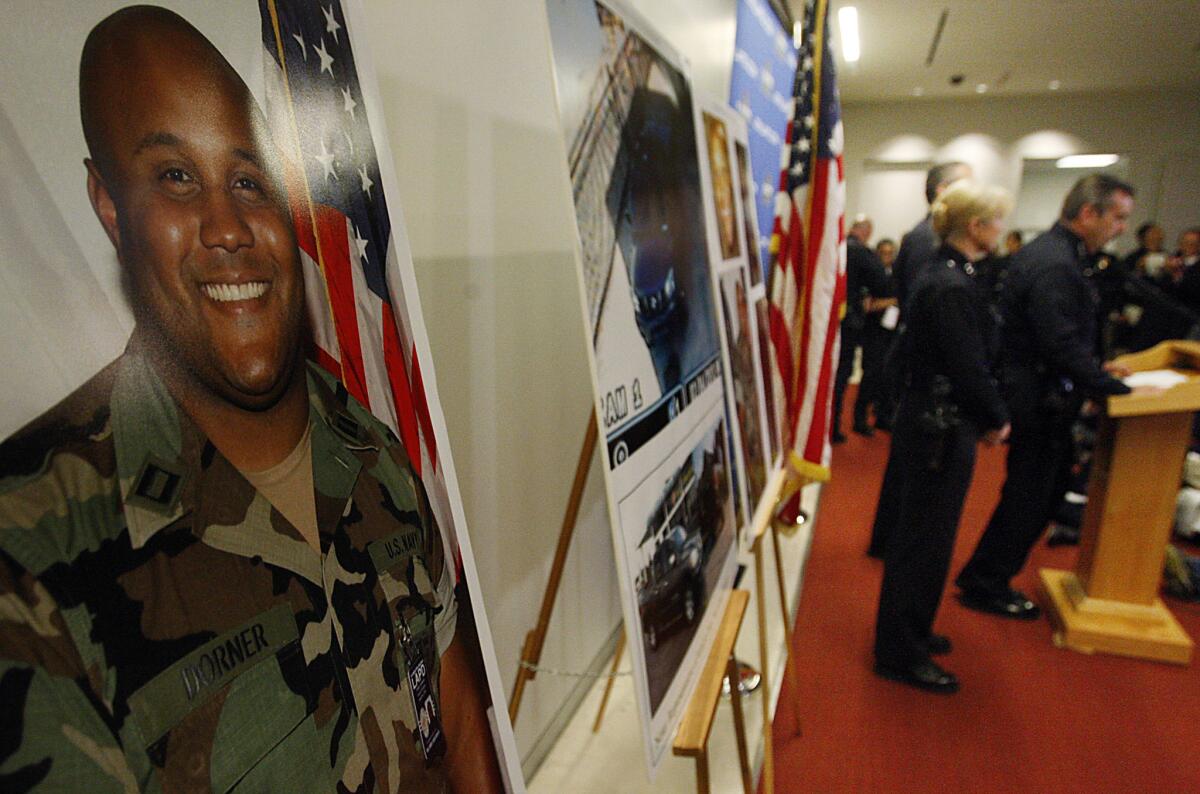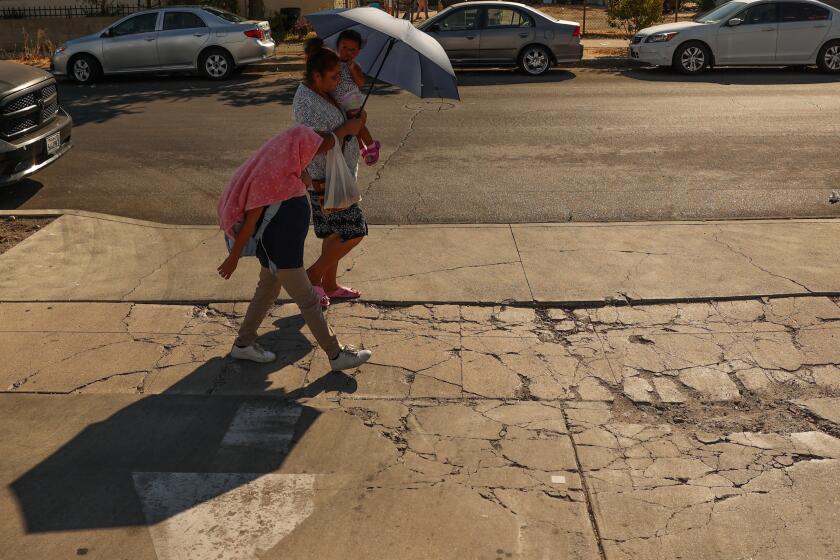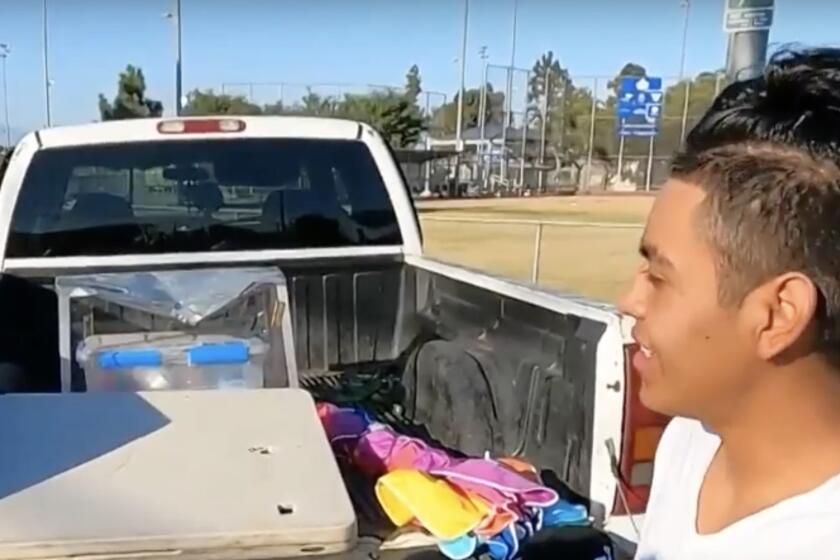LAPD report upholds decision to fire Christopher Dorner

Christopher Dorner, the ex-Los Angeles police officer who went on a killing rampage to avenge his firing from the LAPD, lied repeatedly to further a “personal agenda” during his short time on the force and deserved to be thrown out of the department, police officials concluded in a report released Friday.
Police Chief Charlie Beck ordered an internal review of Dorner’s 2009 firing to address claims Dorner made about the department in a rambling manifesto he posted online, in which he described an LAPD rife with racism and corruption.
Beck made the move after a chorus of critics from both from within the department and outside its ranks latched on to Dorner’s allegations, saying that while they condemned the killings, Dorner’s dark description of the agency rang true. That swell of harsh criticism, Beck and others feared, threatened to undo years of work by police and city officials to rehabilitate the department’s reputation after decades marked by abuses and scandal.
DOCUMENT: Read the LAPD report
Dorner was fired in 2009, and in February of this year, police say, he shot to death an Irvine woman -- the daughter of the attorney who defended him at his disciplinary proceedings -- and her fiance. Dorner then is believed to have killed two police officers and wounded three other people as he evaded capture during an intense manhunt.
After more than a week on the run, Dorner was chased by authorities into a cabin in the mountains near Big Bear, where he died from what the report confirmed was a self-inflicted gunshot wound.
The 39-page report, written by Gerald Chaleff, a former criminal defense attorney who serves as a special assistant to Beck, staunchly defended the decision to kick Dorner out of the LAPD. Police investigators at the time, Chaleff concluded, were right when they found Dorner, then a rookie, fabricated a story in 2007 accusing his training officer of repeatedly kicking a handcuffed, mentally ill man.
Chaleff focused largely on the fact that Dorner waited nearly two weeks before he reported the alleged kicks to a supervisor and then offered conflicting explanations for the delay. For example, Dorner at one point told investigators he trusted only one supervisor at his station and wanted to wait until he could report the abuse to him. Records, however, showed that the supervisor and Dorner worked the same shift on several days before Dorner spoke up, the report found.
The report also buttressed the finding of officials at the time of what motivated Dorner to fabricate the story of the kicks. He made up the story, Chaleff said, only after his training officer warned him that his performance in the field had been poor and that she was contemplating whether to give him failing marks in an upcoming assessment.
“The inconsistencies in Dorner’s various explanations as to why there was a delay in his reporting the alleged kicks to a supervisor, and the fact that he offered no reasonable rationale for such delays, cast considerable doubt on the credibility of his allegations,” the report said. “Dorner’s statements concerning the delay continued to change throughout his testimony and appeared to be self-serving and in several instances were blatant fabrications.”
Chaleff wrote that he found no credible evidence to support Dorner’s claim. The mentally ill man who was arrested was too sick to be coherent and three witnesses to the arrest all said they did not see the man get kicked.
Chaleff also knocked down allegations made by Dorner that his training officer was friends with a member of the disciplinary board that fired him and others involved in the investigation. Interviews with the various officers, as well as others who might have known about the alleged relationships, turned up nothing to support Dorner’s claims, according to the report.
The report outlined other apparent lies Dorner told and what Chaleff said were his attempts to use the LAPD’s discipline system “to further his own agenda.” In one instance, internal affairs investigators asked Dorner if he had suffered any retaliation at work for reporting his training officer and Dorner said he had not. Days later, however, Dorner filed a retaliation complaint, saying an unknown officer had urinated on his uniform jacket. Tests on the jacket by the LAPD lab disproved the allegation.
Chaleff emphasized as well that Dorner appealed his firing twice in the courts and to the LAPD’s independent inspector general, and, each time the decision was upheld.
“Based on the evidence at hand, it appears that the allegation of his training officer kicking an arrestee was ... an allegation to further his personal agenda,” Chaleff wrote. “After careful examination of all the evidence, it is clear that Dorner could not be deemed credible ... Dorner’s propensity to fabricate allegations against his coworkers and his willingness to say that abuses occurred that clearly did not, all point to the very reason he could not be a part of this department.”
Department officials are continuing to work on a broader report that examines in general the LAPD’s discipline system and claims by officers that it is unfair.
ALSO:
Protesters square off over O.C. hospital’s abortion ban
Corona teacher accused of having sex with students put on leave
Castaic man accused of using homemade spear to kill dog and cat
Twitter: @joelrubin
More to Read
Sign up for Essential California
The most important California stories and recommendations in your inbox every morning.
You may occasionally receive promotional content from the Los Angeles Times.











